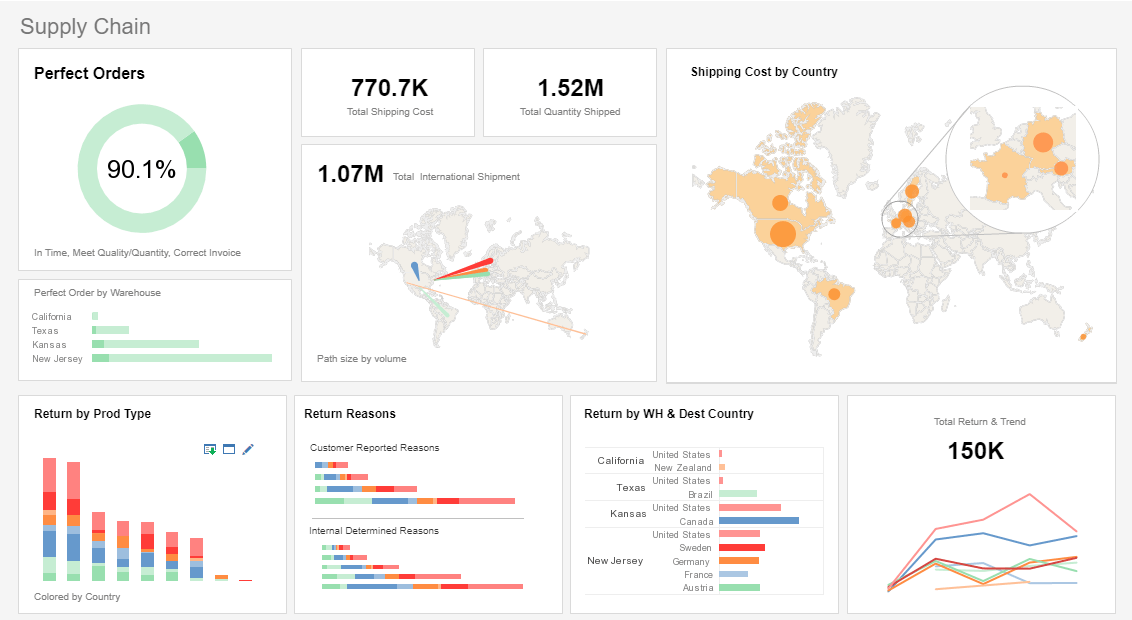8 Reasons Why Supply Chain Management Benefits From Big Data
Big data analytics plays a huge role in improving supply chain management, because it helps out various parts of a company, like:
- Strategy
- Operations, AND
- Tactics
Big data helps companies focus more on things like:
- Improving delivery times
- Reducing the communication gap between manufacturers and suppliers
- Having decision-makers achieve operational efficiency
- Having management monitor performance to improve productivity
- Having management make augment data-driven decisions to reduce costs and improve service levels.
In this article, we'll explain the 8 reasons why supply chain management benefits from the analytics generated by big data.
| #1 Ranking: Read how InetSoft was rated #1 for user adoption in G2's user survey-based index | Read More |
1. Product Traceability Is Possible With Big Data
It's important to have product traceability in your supply chain operations. With great product traceability, supply chain managers can easily trace a product by using barcode scanners and radio frequency identification devices attached to certain products. With big data, businesses can gather accurate product information, so that operators can carry out a successful distribution cycle – from production to retail.
2. The Risks Are Better To Understand With Big Data
If you're wary about risks that can happen in supply chain management, then fear not! Big data ensures that supply chain analytics will help determine the unknown and known risks. Analytics can also forecast future risks by identifying patterns and trends that occur within the supply chain.
 |
View a 2-minute demonstration of InetSoft's easy, agile, and robust BI software. |
3.Sourcing Is More Optimized And Simplified
In the sourcing process, supply chains will work with vendors. This process consists of:
- Working with numerous vendors
- Making orders
- Taking into account how many individual items are in each order, AND
- Taking into account how each order is shipped
Now, keep in mind that these tasks don't include variables such as:
- Emergency orders
- Damaged materials, AND
- Other things that happen unexpectedly
Big data allows you to connect all status and pricing data from your vendors worldwide.
 |
View live interactive examples in InetSoft's dashboard and visualization gallery. |
4. Data Is Safe In The Cloud
The cloud lets you save the data that you can use later on to handle supply chain management in a number of ways. By storing your data in the cloud, metrics are unified and updated in real time. As a result, in-depth analytics can be used to provide insights, including:
- Real-time alerts that notify supply chains on gaps and issues
- Organizing all vendors, regardless of consistency on shipping/timing issues
- Finding materials with consistent quality issues
- Getting rid of unnecessary steps in the process
5. Inventory Management Is More Enhanced
If you're a big-box retailer or an online store, and you have a sizeable inventory, you'll most likely run into several issues. But with big data, analytics allows operation managers to get a real-time overview of operations and identify anything that might be hindering supply chain processes. Plus, consumer trends show businesses how to promote great products, while optimize inventory.
 |
Read the top 10 reasons for selecting InetSoft as your BI partner. |
6. Big Data Lets You See Consumer Behavior And Usage Patterns
Nowadays, many businesses can't function without big data, because the analytics tell them how consumer behavior and usage patterns are faring. With this valuable information at businesses' fingertips, they can find new ways to retain their customers and increase sales.
7. Fulfillment Processes Are Made Easier
Fulfillment analytics can help maximize revenue and retain customers by having supply chain management look at both customer fulfillment and the warehouse itself. This allows management to formulate the final steps of production. Such data will have management keep the following objectives in mind:
- For customers, determine whether they'll receive their orders on time or earlier.
- For the shipping process, determine which vendor(s) is consistently delivering late.
- For warehouses, have inventory stored efficiently, and see if there are any trends in accidents or injuries.
Read what InetSoft customers and partners have said about their selection of Style Scope for their solution for dashboard reporting. |
8. Big Data Lets You Prepare For The Future
Finally, big data can help businesses see what's to come in future projects. If you want to get ahead of the curve, then look at the data. Companies can leverage analytics to process both unstructured and structured data, and formulate predictions on what can happen if something goes wrong, or what's to come based on any trends and issues, thus reducing risks.
Conclusion
So, you see, big data analytics – unified and leveraged – can help supply chain management oversee production from start to finish. In other words, companies will see a bigger picture by putting all the data into one place, and analyzing processes (i.e. sourcing, warehousing, etc.) within an established database.
By taking into account the benefits that big data can bring to supply chain management, you'll see that analytics is essential to ensuring a steady flow of production and business.
 |
Read the top 10 reasons for selecting InetSoft as your BI partner. |
About the Author
Katherine Rundell is a supply chain writer. She is also a proofreader at Writingpopulist and Top Canadian Writers. As a professional writer, she specializes in analytics, tech trends, and digital advertising. Also, she is a blogger at UKWritings.



